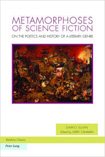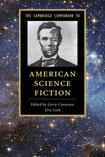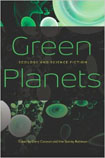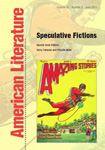Archive for the ‘Look at what I put on the Internet’ Category
SFFTV Call for Reviewers
SFFTV is looking for reviewers for a few recent books:
Becky Bartlett’s BADFILM: INCOMPETENCE, INTENTION, FAILUREhttps://edinburghuniversitypress.com/book-badfilm.html
Jayna Brown, BLACK UTOPIAS: SPECULATIVE LIFE AND THE MUSIC OF OTHER WORLDShttps://www.dukeupress.edu/black-utopias
Arthur Krker and Marilouise Kroger, TECHNOLOGIES OF THE NEW REAL: VIRAL CONTAGION AND DEATH OF THE SOCIALhttps://utorontopress.com/9781487540227/technologies-of-the-new-real/
Michael Pitts, ALTERNATIVE MASCULINITIES IN FEMINIST SPECULATIVE FICTION
https://rowman.com/ISBN/9781793636614/Alternative-Masculinities-in-Feminist-Speculative-Fiction-A-New-Man
Robert Yeates, AMERICAN CITIES IN POST-APOCALYPTIC SCIENCE FICTIONhttps://www.uclpress.co.uk/products/178921
Contact Gerry Canavan (gerrycanavan@gmail.com) if you are interested!
Grad School Achebe #8: “The Voter”
The long-anticipated to The Many Saints of Newark bonus episode is finally here: “The Voter”!
Brand New Semester, Same Old Pandemic
I’ve finally beaten my syllabi into shape for the semester:
ENGLISH 3241: “Crafting the Short Story” (my summer/J-term lit/creative writing hybrid, now in person!)
ENGLISH 4716/5716: “Classics of Science Fiction” (featuring Slaughterhouse-Five, The Female Man, Kindred, Ted Chiang, The Fifth Season, and a NCAA-style tournament to determine which 1980s SF movie we’re going to watch instead of reading Neuromancer)
Comments and suggestions welcome, as always!
GSA #3: NO LONGER AT EASE!
Sixty years later, Gerry and Aaron are joined by Keguro Macharia to talk about No Longer at Ease! Should it be illegal to teach Things Fall Apart without also teaching its sequel? Find out within…
Grad School Achebe: Episode Zero
The first episode of season two! Gerry and Aaron discuss the gameplan for Grad School Achebe, the history and reception of African literature inside and outside academia, Achebe’s place in the canon, his uncanny recurrent deaths on social media, the finer points of pronunciation, and more. Next week: the podcast falls apart.
Texts discussed:
Chinua Achebe in conversation with Bill Moyers (1988)
Chinua Achebe in conversation with Lewis Nkosi and Wole Soyinka (1964)
Chinua Achebe, No Longer at Ease (2015)
A Hypercontemporary Literature Syllabus! And More!
The first week is already over and I realized I never got around to putting up my syllabi. I’m teaching two classes this semester, an all-Zoom revision of my Tolkien class and an all-Zoom survey of 21st Century Literature that I decided to focus on texts from more or less the last two years. (I also have an independent study on Gender and Sexuality in New Wave SF that’s been terrific; no formal syllabus for that one but we’re reading Le Guin, Russ, Delany, Tiptree, Lem, the Tarkovskys, all your faves.)
Thanks so much to everyone on Facebook and Twitter who flooded me with suggestions for the 21st Century course. In the end I was so overwhelmed by the possibilities I solicited suggestions directly from the students, which allowed me to craft a syllabus that was both inside and outside my usual wheelhouse, hopefully in ways that will be fun for both my students and myself. And we still get to be surely the first class in the world to study Ishiguro’s new book.
The syllabus doesn’t list the films they picked, but our class vote landed on Parasite and Soul for the last two weeks of class, an intriguing dialectic arraying the full possibilities of the human experience…
| synch | M | 1/25 | FIRST DAY OF CLASS |
| synch | W | 1/27 | Among Us game and thinkpieces [D2L] |
| asynch | F | 1/29 | Giorgio Agamben, “What Is the Contemporary?” [D2L] |
| synch | M | 2/1 | PLAY/MOVIE: Heidi Schreck, What the Constitution Means to Me (including bonus material) [Amazon Prime] |
| synch | W | 2/3 | What the Constitution Means to Me discussion continues |
| asynch | F | 2/5 | POEM: Andrea Gorman, “The Hill We Climb” [D2L] and online reactions |
| synch | M | 2/8 | SHORT STORY: N.K. Jemisin, “Emergency Skin” [Amazon Kindle] |
| synch | W | 2/10 | SHORT STORY: Ted Chiang, “Anxiety Is the Dizziness of Freedom” [online] |
| asynch | F | 2/12 | Jemisin and Chiang sandbox assignment |
| synch | M | 2/15 | COMIC: Chris Ware, Rusty Brown, Vol. 1, part one |
| synch | W | 2/17 | COMIC: Chris Ware, Rusty Brown, Vol. 1, part two |
| asynch | F | 2/19 | COMIC: Chris Ware, Rusty Brown, Vol. 1, part three sandbox assignment |
| synch | M | 2/22 | COMIC: Chris Ware, Rusty Brown, Vol. 1, part three discussion |
| synch | W | 2/24 | COMIC: Chris Ware, Rusty Brown, Vol. 1, part four |
| asynch | F | 2/26 | Haruki Murakami, “Confessions of a Shinagawa Monkey” [D2L]optional: Haruki Murakami, “A Shinagawa Monkey” [D2L] |
| synch | M | 3/1 | Haruki Murakami, “Confessions of a Shinagawa Monkey” discussion |
| synch | W | 3/3 | Hades [Steam or Nintendo Switch] |
| asynch | F | 3/5 | Hades sandbox assignment |
| synch | M | 3/8 | Hades discussion continues |
| W | 3/10 | UNIVERSITY MENTAL HEALTH DAY—NO CLASS | |
| asynch | F | 3/12 | Kim Stanley Robinson, The Ministry for the Future, chapters 1-16 CLOSE READING DUE |
| synch | M | 3/15 | Kim Stanley Robinson, The Ministry for the Future, chapters 17-30 |
| synch | W | 3/17 | Kim Stanley Robinson, The Ministry for the Future, chapters 31-45 |
| asynch | F | 3/19 | Kim Stanley Robinson, The Ministry for the Future, chapters 46-60 |
| synch | M | 3/22 | Kim Stanley Robinson, The Ministry for the Future, chapters 61-74 |
| synch | W | 3/24 | Kim Stanley Robinson, The Ministry for the Future, chapters 75-90 |
| asynch | F | 3/26 | Kim Stanley Robinson, The Ministry for the Future, whole book |
| synch | M | 3/29 | Kim Stanley Robinson, The Ministry for the Future and responses |
| synch | W | 3/31 | Kim Stanley Robinson, The Ministry for the Future and responses |
| F | 4/2 | GOOD FRIDAY—NO CLASS | |
| synch | M | 4/5 | Kazuo Ishiguro, Klara and the Sun (page range TBD) |
| synch | W | 4/7 | Kazuo Ishiguro, Klara and the Sun (page range TBD) |
| asynch | F | 4/9 | Kazuo Ishiguro, Klara and the Sun (page range TBD) |
| synch | M | 4/12 | Kazuo Ishiguro, Klara and the Sun (page range TBD) |
| synch | W | 4/14 | Kazuo Ishiguro, Klara and the Sun (page range TBD) |
| asynch | F | 4/16 | Kazuo Ishiguro, Klara and the Sun (page range TBD) MINISTRY RESPONSE DUE |
| synch | M | 4/19 | CREATIVE NONFICTION: Zadie Smith, Intimations (first half) |
| synch | W | 4/21 | CREATIVE NONFICTION: Zadie Smith, Intimations (second half) |
| asynch | F | 4/23 | MOVIE or TV SHOW TBD |
| synch | M | 4/26 | MOVIE or TV SHOW TBD |
| synch | W | 4/28 | MOVIE or TV SHOW TBD |
| asynch | F | 4/30 | MOVIE or TV SHOW TDB |
| synch | M | 5/3 | MOVIE or TV SHOW TBD |
| W | 5/5 | UNIVERSITY MENTAL HEALTH DAY—NO CLASS | |
| synch | F | 5/7 | LAST DAY OF CLASS INTIMATION DUE |
GSV 18: HOCUS POCUS!
Evan Kindley joined us for the latest episode of the Grad School Vonnegut podcast, on the late novel Hocus Pocus! It’s definitely as good as our other episodes!

Canavan vs. Endgame, Dawn of Thinkpiece
I’ve got a short piece up about Endgame up at Frieze, if you’re interested: Why Avengers: Endgame Doesn’t Have to Make Sense. And a bonus after-the-credits observation here, for the true fans…
Big link post coming soon! Just didn’t want this one to die on the vine in the meantime.
Spring 2019 Syllabi! “Classics of Science Fiction” and Game Studies
I’m teaching three courses this semester: a graduate level course titled “Classics of Science Fiction,” a first-year seminar on game studies, and the second half of our yearlong “methods of inquiry” sequence (also for first-years). You can see the full syllabi in all their glory at my website:
ENGL 6700: Classics of Science Fiction
Main texts: Jack Finney, Invasion of the Body Snatchers; Philip K. Dick, Do Androids Dream of Electric Sheep?; Ursula K. Le Guin, The Dispossessed; Octavia E. Butler, Kindred; William Gibson, Neuromancer; Octavia E. Butler, Bloodchild and Other Stories; Kim Stanley Robinson, The Lucky Strike; Alan Moore and Dave Gibbons, Watchmen; Invasion of the Body Snatchers (1956), 2001, Blade Runner, and Star Trek: The Next Generation; “That Only a Mother,” “The Evitable Conflict,” “All You Zombies,” “The Heat-Death of the Universe”; “Houston, Houston, Do You Read” and “The Screwfly Solution,” “The Gernsback Continuum,” “Game Night at the Fox and Goose”; “The Space Traders”; criticism from Suvin, Sontag, Jameson, Freedman, Delany, Csiscery-Ronay, Rieder, and even Gerry Canavan himself
Main texts: Ian Bogost, How to Do Things with Video Games; Alexander Galloway, Gaming: Essays on Algorithmic Culture; Frans Märyä, An Introduction to Game Studies; The Stanley Parable, Doom, Journey, Bandersnatch, Tetris, Candy Crush, Civilization, SimCity, The King of Kong, Braid, FIFA 19
CORE 1929H: Methods of Inquiry: The Mind
WEEK ONE—HISTORY: George Rousseau, “Depression’s Forgotten Geneaology: Notes Towards a History of Depression”
WEEK TWO—STRUCTURE: Luigi Esposito and Fernando M. Perez, “Neoliberalism and the Commodification of Mental Health”
WEEK THREE—PERSONAL NARRATIVE: Leslie Kendall Dye, “It Isn’t That Shocking”
That last one is a 1.5 credit course that’s mostly devoted to independent research in the second half, but it did allow me the chance to formalize something like a definition of the difference between the physical sciences and the academic humanities as I see them operating, at least at the level of the very extreme generalization, for better or worse:
Last semester we were working at the intersection of the sciences and the humanities, exploring the ways each of these two “cultures” engage questions of knowledge production and dissemination. In contrasting the humanities to the sciences, I suggested that contemporary humanities approaches—speaking of course extremely generally—tend to extend from a few assumptions that are not always shared by the sciences (especially the physical sciences, but also some historically conservative social science disciplines like economics or political science):
1) social causation: the proposition that the best explanations for social phenomena originate in social structures, rather than in individual psychologies, pathologies, or choices;
2) social construction: the proposition that knowledge is embedded within social structures like language, ideology, history, and economics, rather than existing radically apart from social structures in supposedly objective facts or eternal truths;
3) social justice: the proposition that knowledge has a politics, and that we should choose methods of knowledge production and dissemination that help heal the world rather than do harm or simply remain neutral.













